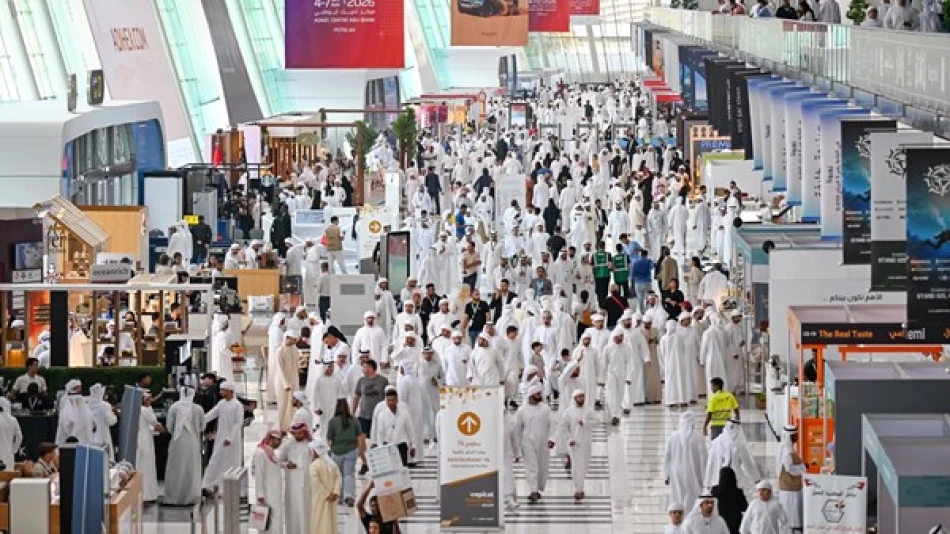
Abu Dhabi International Hunting and Equestrian Exhibition Concludes with Massive Visitor Turnout
Abu Dhabi Hunting Exhibition Breaks Records, Signals UAE's Growing Cultural Export Power
The Abu Dhabi International Hunting and Equestrian Exhibition has emerged as a cultural powerhouse, attracting over 379,000 visitors in 2025 and cementing the UAE's position as a global hub for heritage preservation and outdoor sports innovation. With 9.2% growth over 2024 and exhibitors from 68 countries already booking 60% of next year's space, the event demonstrates how traditional practices can drive modern economic success.
Record-Breaking Numbers Tell a Larger Story
The 22nd edition of the exhibition, held under the patronage of Sheikh Hamdan bin Zayed Al Nahyan, shattered attendance records with 379,572 visitors over nine days. This represents the highest turnout since the event's inception in 2003, signaling growing international appetite for authentic cultural experiences.
The exhibition featured 2,068 exhibitors and brands representing 68 countries, spanning 15 specialized sectors from falconry and equestrian sports to camping and traditional crafts. Four new sectors were introduced this year: marketplace, knives, Arabian Saluki dogs, and camels, reflecting the event's continuous evolution.
Economic Impact Beyond Tourism
The financial success extends beyond visitor numbers. Eight falcon auctions generated AED 2.199 million in sales, while camel auctions reached AED 1.7 million. The returning Arabian horse auction exceeded AED 500,000, demonstrating the exhibition's role as a serious commercial platform.
More tellingly, over 60% of exhibition space for 2026 has already been reserved by companies, indicating strong confidence in the event's commercial viability and growth trajectory.
Cultural Diplomacy Through Heritage
Majed Ali Al Mansoori, Secretary-General of the Emirates Falconers Club, emphasized how the exhibition positions Abu Dhabi as a global center for hunting and equestrian heritage preservation. This aligns with the UAE's broader strategy of leveraging cultural assets for soft power projection.
The event's theme "Renewing Heritage" reflects a sophisticated approach to tradition—not as static museum pieces, but as living practices that can adapt and thrive in contemporary contexts. This philosophy mirrors successful cultural strategies in countries like Japan and South Korea, where traditional arts have been reimagined for global audiences.
Educational Integration Builds Future Audiences
The exhibition organized educational visits for thousands of students from various schools, introducing young people to Emirati heritage through hands-on experiences. The "Little Falconer Village" and traditional majlis-making workshops represent long-term investment in cultural continuity.
This educational component addresses a critical challenge facing heritage industries worldwide: ensuring traditional knowledge transfers to younger generations while remaining relevant in digital-native societies.
Strategic Expansion Signals Broader Ambitions
ADNEC Group's announcement of the first Al Ain International Hunting and Equestrian Exhibition in November 2025 represents strategic geographic expansion. Al Ain's historical significance in falconry and hunting culture makes it a natural choice, but the move also indicates confidence in market demand beyond Abu Dhabi.
Hamid Matar Al Dhaheri, ADNEC Group's Managing Director and CEO, noted that numerous companies have already expressed interest in participating in Al Ain's inaugural edition, suggesting the market can support multiple large-scale events.
Sustainability Integration Appeals to Global Audiences
The exhibition's emphasis on sustainable hunting practices and environmental conservation addresses growing global concerns about wildlife protection. Interactive workshops and specialized forums focused on sustainability help position traditional hunting as compatible with modern conservation ethics.
This messaging resonates particularly well with international visitors from markets where hunting faces increasing scrutiny, potentially opening new audience segments while maintaining traditional practitioner loyalty.
Market Implications for Heritage Tourism
The exhibition's success offers insights for investors and policymakers interested in heritage-based economic development. Unlike passive cultural tourism, this model creates active participant communities willing to spend significantly on authentic experiences and related products.
The strong pre-booking rates for 2026 suggest exhibitors view this as a reliable platform for reaching high-value customers, particularly important as global luxury markets seek authentic experiences over material goods.
Regional Competition and Differentiation
While Qatar and Saudi Arabia invest heavily in cultural events, the UAE's approach of combining heritage preservation with commercial viability creates a distinctive market position. The exhibition's 22-year track record provides credibility that newer events struggle to establish.
The planned return to ADNEC Abu Dhabi on August 29, 2026, with expanded programming and international partnerships, positions the UAE to maintain its leadership in this specialized but lucrative sector.
The exhibition's evolution from local heritage celebration to international cultural platform demonstrates how traditional practices can drive modern economic success when properly positioned and professionally managed.
Most Viewed News

 Layla Al Mansoori
Layla Al Mansoori






